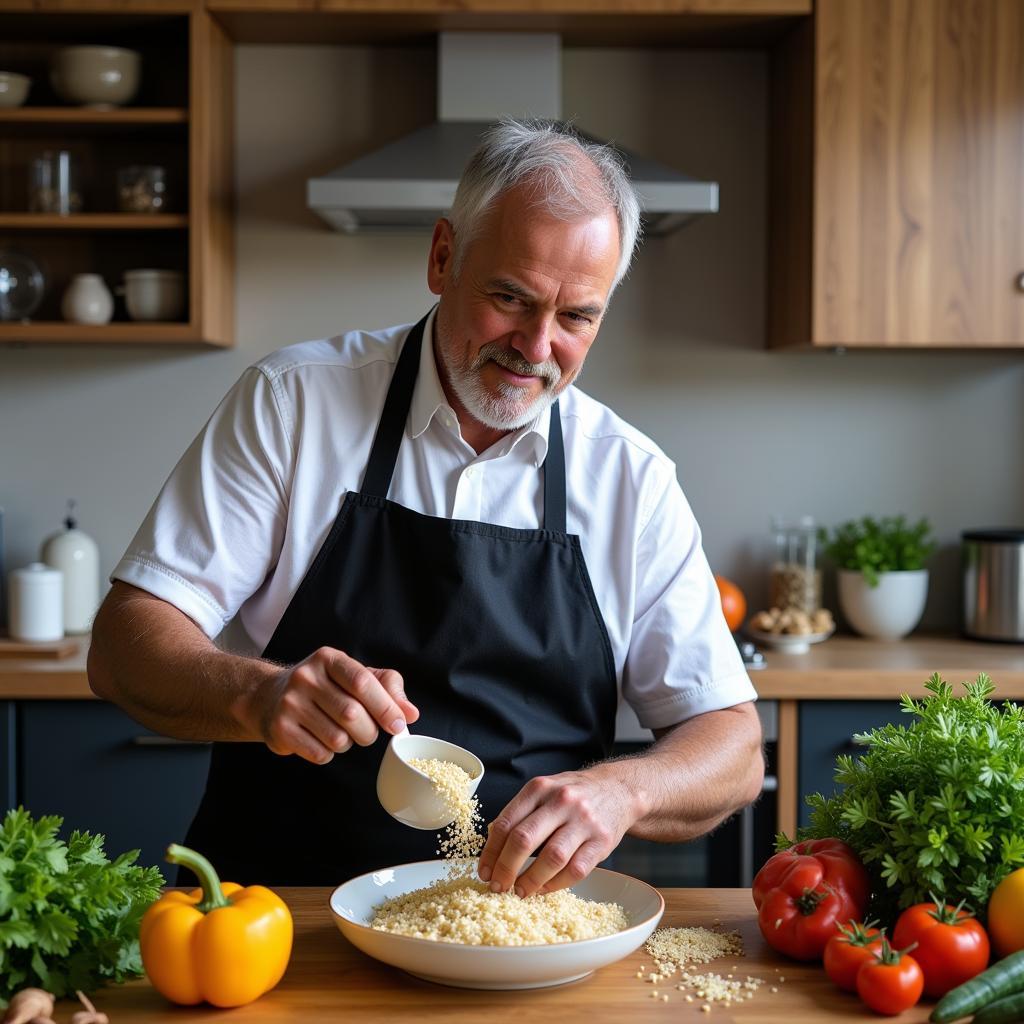Food for life takes on a new meaning when a champion boxer hangs up their gloves. After years of rigorous training and strict diets, retirement opens up a world of culinary possibilities while also presenting unique nutritional challenges. A retired boxer needs to fuel their body for a life outside the ring, focusing on long-term health and well-being.
Nutritional Needs for a Food for Life Approach After Boxing
What does “food for life” mean for a retired boxer? It’s about shifting from performance-driven nutrition to a sustainable, health-focused approach. While they may no longer need the intense calorie intake for training, they still require a balanced diet to maintain muscle mass, manage weight, and support overall health. This often involves reducing calorie intake while ensuring adequate protein, healthy fats, and complex carbohydrates.
Prioritizing Protein for Muscle Health
Protein remains a cornerstone of a retired boxer’s diet. It’s essential for repairing and maintaining muscle tissue, which can naturally decline with age and reduced activity. Lean protein sources such as chicken, fish, beans, lentils, and tofu are excellent choices.
 Retired boxer enjoying a healthy grilled chicken salad
Retired boxer enjoying a healthy grilled chicken salad
Healthy Fats: Fueling the Body and Mind
Healthy fats play a vital role in hormone production, brain function, and overall well-being. Incorporating sources like avocados, nuts, seeds, and olive oil can help maintain optimal health. Omega-3 fatty acids, found in fatty fish like salmon and tuna, are particularly beneficial for reducing inflammation and supporting heart health.
Complex Carbohydrates: Sustained Energy for Everyday Life
Complex carbohydrates provide sustained energy for daily activities. Choosing whole grains like brown rice, quinoa, and whole-wheat bread over refined carbohydrates helps regulate blood sugar levels and promotes digestive health. This is a crucial shift from the pre-fight carb-loading strategies.
 Retired boxer preparing a healthy meal including quinoa.
Retired boxer preparing a healthy meal including quinoa.
Managing Weight and Metabolism After Retirement
Maintaining a healthy weight is often a key concern for retired boxers. Metabolism naturally slows down with age and reduced activity, making weight management more challenging. Portion control and mindful eating practices become even more important.
Mindful Eating Practices for Long-Term Wellness
Mindful eating encourages paying attention to hunger cues and savoring each bite. It’s about appreciating the taste, texture, and aroma of food, which can help prevent overeating and promote a healthier relationship with food. This is a shift from the often strict and regimented eating habits required during training.
Staying Hydrated: A Simple Yet Crucial Habit
Hydration is crucial for overall health and can even aid in weight management. Drinking plenty of water throughout the day supports digestion, energy levels, and many other bodily functions.
Adapting to a “Food for Life” Mindset
Transitioning to a “food for life” mindset is about embracing a balanced approach to nutrition, one that nourishes both the body and mind. It’s about making sustainable choices that support long-term health and well-being.
 Retired boxer selecting fresh produce at the grocery store
Retired boxer selecting fresh produce at the grocery store
Conclusion: Embracing Food for Life as a Retired Boxer
Food for life for a retired boxer is about more than just fueling the body; it’s about embracing a healthy lifestyle. By prioritizing nutrient-rich foods, managing weight, and adopting mindful eating practices, retired boxers can continue to thrive long after they leave the ring.
FAQ
- How much protein does a retired boxer need?
- What are the best sources of healthy fats for retired athletes?
- How can retired boxers manage weight gain after retirement?
- What are some examples of mindful eating practices?
- Why is hydration important for retired boxers?
- What are some good complex carbohydrates for sustained energy?
- How can a retired boxer transition to a “food for life” mindset?
Need support? Contact us at Phone Number: 02437655121, Email: minacones@gmail.com or visit us at 3PGH+8R9, ĐT70A, thôn Trung, Bắc Từ Liêm, Hà Nội, Việt Nam. We have a 24/7 customer service team.